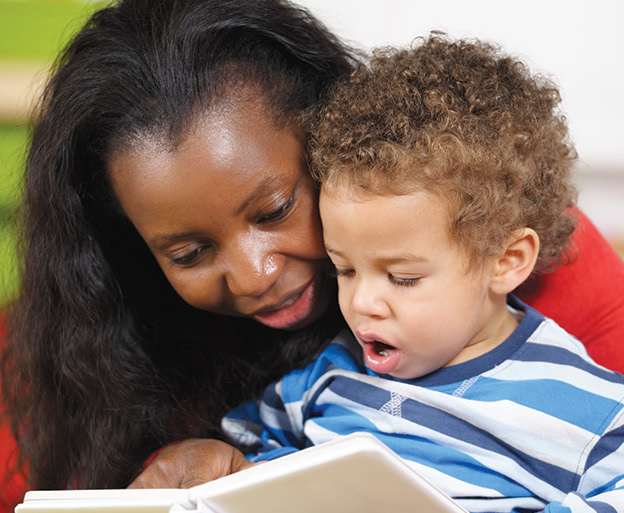
Section
Your Toddler from 1 to 2 Years
Starting around age 1, your baby becomes a toddler. He begins to explore his independence. He has strong likes and dislikes. He will often say “No!” and “Mine!” One moment he may want to get away from you, and the next moment he may cling to you. He needs your gentle guidance to help him learn and feel secure.
Where to Find Help
Services for babies and toddlers at risk of disability or who have a disability.
1-800-515-2229
Information for parents on child development, vaccines, food safety, and more.
Information from the American Academy of Pediatrics on children’s health, safety, and well-being.
Things You Can Do
Spend Time with Your Child Every Day
Take time to sit close to your child and give him your full attention. Look at his face while you talk to him. This helps him learn to talk.
Play and be active with him. Play finger games. Pour sand from one container to another. Bang on pots or stones. Run and play tag.
Hug your child often. This helps him feel loved and secure.
Help Your Child Learn to Talk
Talk, read, and sing to your child whenever you are together.
Ask questions, like “Where’s the ball?” or “What does the kitty say?” Encourage your child to answer in words.
Read to him every day. Read his favorite books again and again.
Use the names for everyday objects like toys, clothes, and animals.
If your child is not using words at 16 months or phrases at 2 years, talk to your doctor. Your child may have a problem. Or he may need more help to learn language. The California Early Start program can help.
Have a Bedtime Routine
Most toddlers do not want to go to bed. Try these tips:
Sometime between 1 and 2 years, toddlers stop needing 2 naps a day. When your child seems ready, gradually drop to 1 nap a day.
Watch to see when he usually gets sleepy. Then make that time his bedtime.
Have a bedtime routine, such as a bath, brushing teeth, a story, and a tuck-in. Then leave the room.
If he cries, comfort him, but try not to turn on the light or pick him up.
Limit Videos, Video Games, and TV
Babies and toddlers who play with smart phones and tablets may start to talk later. Read to your child instead. Doctors advise that children younger than 18 months should not use phones or tablets, or watch TV.
Make Your House Safe
Toddlers do not understand why it is bad or dangerous to do something. Try to make your home safe for your child to play freely. Look around each room. Remove things that could hurt him or get broken. That way you will not have to say “no” all the time. Even though you will spend a lot of time teaching your child what not to do, remember to praise his good behavior often.
Toddlers Learn with Active Play
Your toddler learns by moving, climbing, fitting into spaces, and carrying and dumping things. His waking moments are filled with discoveries. He needs safe and interesting places to explore and learn. Pots and pans, boxes, blocks, and plastic buckets and shovels make good toys for toddlers.
Learning Words and Phrases
Between ages 1 and 2, children learn many new words and start to use phrases. Children will:
Use 20 or more words.
Know the names of familiar people.
Follow simple directions, like “Get the ball.”
Combine 2 or more words, like “What is that?” or “More milk.”
Point to people, toys, and body parts when asked.
Understand simple stories and songs.

Ask your child questions and encourage him to answer in words.
Children Learn Languages Easily
No matter what language you speak most comfortably, use it to talk, read, and sing to your toddler. Your child can learn a second language very quickly. Children who learn 2 languages often do better in school.